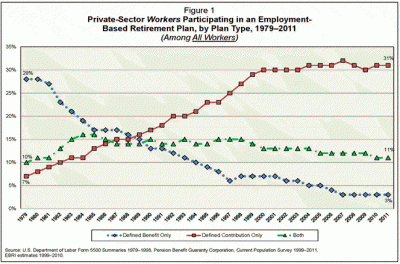The typical working family has only $104,000 saved by retirement according to the Federal Reserve’s Survey of Consumer Finances. The Center for Retirement Research at Boston College estimates that half of American households will not have enough retirement income to maintain pre-retirement living standards. The Employee Benefit Research Institute uses a model that predicts that 83% of baby boomers in the bottom fourth of income distribution will eventually run out of money. Of those with incomes between middle and 75th percentile income distribution more than a quarter will probably run short as well. Companies have been moving away from defined-benefit pension plans that provided working families with their main supplement to Social Security, forcing many to face the responsibility of saving and investing on their own. In 1979, 2 in 5 private sector workers had a defined-benefit pension plan, but today only 14% do. 401(k) plans have a fiduciary that is meant to act in the client ‘best interests,’ but IRA’s must consider ‘suitable’ products before ‘best interest.’ The White House’s Council of Economic Advisors argues that conflicted advise by advisors reduces annual returns by one percent point. In 2010, the Labor Department proposed imposing a fiduciary standard or responsibility on IRA advisors, but pressure from Wall Street forced the Obama administration to back down. What do you think of the current American retirement options?
Source: http://www.nytimes.com/2015/03/04/business/americans-arent-saving-enough-for-retirement-but-one-change-could-help.html?ref=economy

2 Comments
What motivated the U.S companies today to move away from defined-benefit pension plans to Social Security? Why was it that in the past more firms were likely to adopt defined-benefit pension plans? Was there a policy/regulation/social norm that have changed over time? Also, I wonder how rising cost of higher education may have influenced the saving decision among retirees. Increasing number of parents today withdraw their retirement saving in order to put their children through colleges and universities. So how much of an impact do this kind of decision have?
Defined-benefit plans can sink a company if (i) the companies don’t put away enough for retirement (hey, it’s your successor’s successor who will face Chapter 11 while you pocket good bonuses), (ii) if retirees take their time dying or if (iii) investments don’t do well. So shifting to defined contribution plans removes the risk from execs and others interested parties. Finally, if companies lose market share, then their number of retirees won’t decrease (and early retirements can even add to the burden), while revenues shrink. That wasn’t seen as a problem in the late 1950s and 1960s, when such plans developed. New tax rules (ERISA, ca. 1977) forced better accounting, firms had to show underfunding on their books as a liability. Meanwhile a number of industries shrank relative to incomes, and it was typically pre-retirement income that set the pension level. Some industries such as steel, airlines and autos shrank in absolute terms. To my knowledge ALL airlines and steel companies went through Chapter 11, and in the auto industry many suppliers and 2 of the Detroit 3 assemblers did as well. The exception (Ford) today has the weakest balance sheet in the industry (excluding Mitsubishi Motors and probably Peugeot — I don’t know much about Europe).
A key implication: should governments be paternalistic, forcing us to save via social security and similar taxes?
Comments are closed.